高中动词时态和语态总结
- 格式:docx
- 大小:11.65 KB
- 文档页数:4
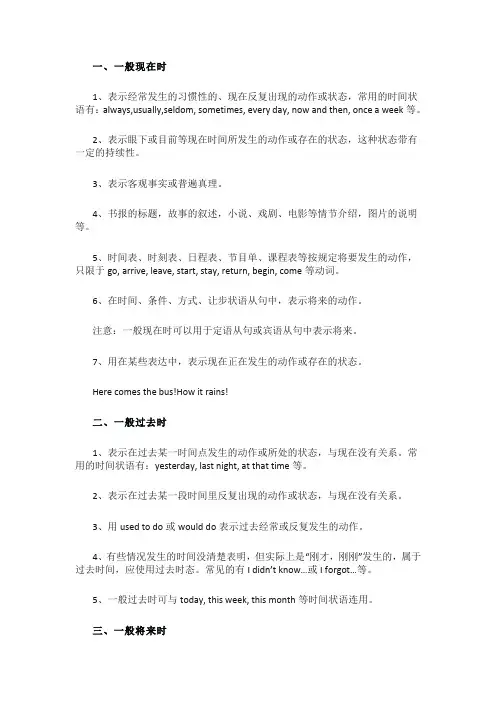
一、一般现在时1、表示经常发生的习惯性的、现在反复出现的动作或状态,常用的时间状语有:always,usually,seldom, sometimes, every day, now and then, once a week等。
2、表示眼下或目前等现在时间所发生的动作或存在的状态,这种状态带有一定的持续性。
3、表示客观事实或普遍真理。
4、书报的标题,故事的叙述,小说、戏剧、电影等情节介绍,图片的说明等。
5、时间表、时刻表、日程表、节目单、课程表等按规定将要发生的动作,只限于go, arrive, leave, start, stay, return, begin, come等动词。
6、在时间、条件、方式、让步状语从句中,表示将来的动作。
注意:一般现在时可以用于定语从句或宾语从句中表示将来。
7、用在某些表达中,表示现在正在发生的动作或存在的状态。
Here comes the bus!How it rains!二、一般过去时1、表示在过去某一时间点发生的动作或所处的状态,与现在没有关系。
常用的时间状语有:yesterday, last night, at that time等。
2、表示在过去某一段时间里反复出现的动作或状态,与现在没有关系。
3、用used to do或would do表示过去经常或反复发生的动作。
4、有些情况发生的时间没清楚表明,但实际上是“刚才,刚刚”发生的,属于过去时间,应使用过去时态。
常见的有I didn’t know…或I forgot…等。
5、一般过去时可与today, this week, this month等时间状语连用。
三、一般将来时1、will/shall do(1)表示将来会出现的动作或状态。
常用的时间状语:this evening, tomorrow, next week/month…,at the end of this term, in a few minutes等。
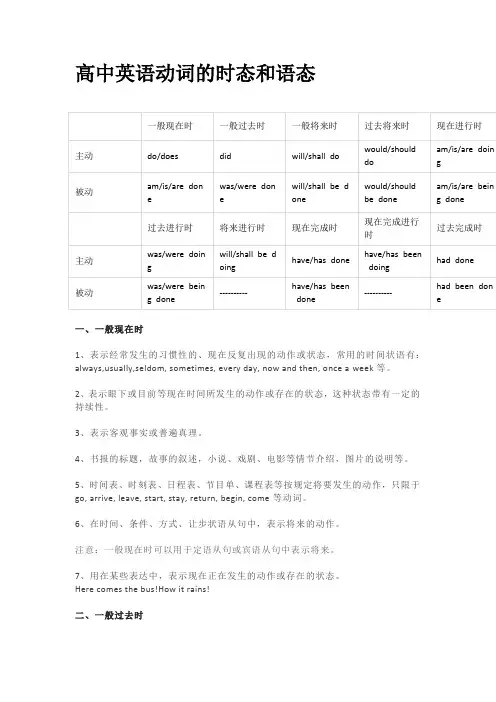
高中英语动词的时态和语态1、表示在过去某一时间点发生的动作或所处的状态,与现在没有关系。
常用的时间状语有:yesterday, last night, at that time等。
2、表示在过去某一段时间里反复出现的动作或状态,与现在没有关系。
3、用used to do或would do表示过去经常或反复发生的动作。
4、有些情况发生的时间没清楚表明,但实际上是“刚才,刚刚”发生的,属于过去时间,应使用过去时态。
常见的有I didn’t know…或I forgot…等。
5、一般过去时可与today, this week, this month等时间状语连用。
三、一般将来时1、will/shall do(1)表示将来会出现的动作或状态。
常用的时间状语:this evening, tomorrow, next week/month…,at the end of this term, in a few minutes等。
(2)表示将来经常发生的动作。
(3)表示事物的固有属性或必然趋势、倾向。
(4)表示说话过程中做出某种决定。
注意:条件状语从句中的will表示“决心,意愿”,此时will是情态动词表示意愿。
2、be going to do(1)表示已经决定或安排要做的事。
(2)表示根据某种迹象认为在最近或将来将要发生的事。
3、be to do(1)表示约定、计划或按职责、义务要求即将发生的动作。
(2)表示说话人的意志、意图、职责、义务、命令。
(3)表示注定要发生的事情。
4、be about to do(1)表示即将发生的动作,意为“正要,即将”。
(2)不可与表示具体的将来时间的副词或副词性短语连用,但可以同由as或when 引导的时间状语从句连用。
5、某些动词的现在进行时表示即将发生的动作。
四、过去将来时1、would/should do表示从过去某一时间来看将要发生的动作或将要存在的状态。
通常用于其主句的谓语为过去时态的宾语从句中。
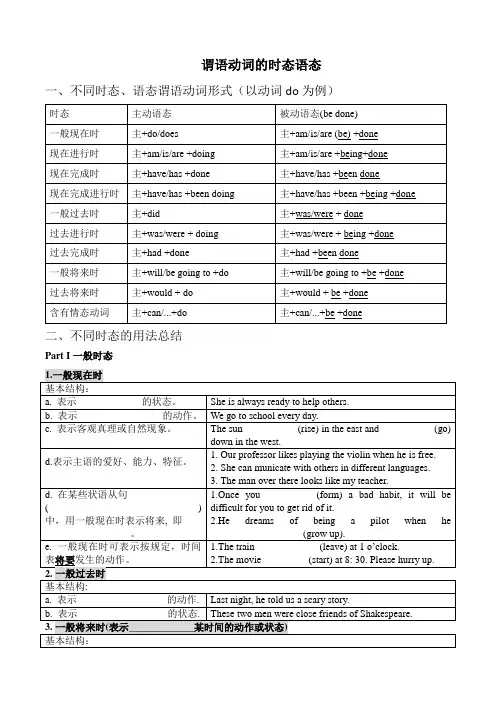
谓语动词的时态语态一、不同时态、语态谓语动词形式(以动词do为例)二、不同时态的用法总结Part I一般时态三、被动语态时态语态专练一.画出下列句子(包括从句)中的谓语动词,并写出其时态语态。
1.This afternoon, we had our chemistry class in the science lab.2. She is studying at an American high school for a year.3. My name is Adam and I’m a freshman at senior high school.4. You should encourage your friend to try new hobbies.5. There, a boat will take you to stay with a local Urus family on an island for three days.6. I’ve been studying English since primary school.7. The team that Lang Ping had built was falling apart.8. One of the best players had been injured, and the team captain had to leave because of heart problems.9. Foreign aid is being organized for the tsunamihit countries.10. China’s ancient civilization has continued all the way through into modern times.11. Some of the symbols can still be seen in today’s hanzi.12. Listening to English radio programme helps me to get used to an English language environment.13. Water from the dam would likely damage a number of temples and destroy cultural relics.14. A mittee was established to limit damage to the Egyptian buildings and prevent the loss of cultural relics.15. Nearly 500,000 highquality digital photographs have been produced since the international project started in 1994.16. Billions of trees are being cut down every day to make paper for humans.17. I sincerely hope that you will be admitted to your ideal university.18. When I was a little child, I once said to my grandmother that I would buy her a big house. 二.用括号里动词的正确形式填空1. A meeting _____________(hold) in Nanjing from March 22 to 24, 2023.2. Then, one day in 1945, Marcel ____________(give) another opportunity by the mountain.3. Since then, Marcel __________(make) mountain climbing his life’s work.4. Spending too much time online ________(make) it difficult to focus on other things in life.5. When I got to the theater, I found out that the tickets __________________________(sell out).6. In the last few years, thousands of films ________________________(produce) all over the world.7. In the near future, more advances in science technology _______________________(make) by scientists.8. The experts are discussing how the cultural relics can _________(save).9. With the help of my teacher, I __________(make) great progress in English so far.10. Tom _________(visit) his grandparents every weekend.11. The problem ______________(solve) sooner or later.12. I ______________(do) my homework in my room as usual when I heard someone screaming.13. The pany _____________(develop) a new app and it will appear on the market next year.14. I went to Ningxia and __________(stay) there for a year.15. Could I use your car? Mine ________________(repair) in the garage now.16. The book __________________(translate) into many languages since it _____________(publish) in 1973.17. He promised that he_____________(marry) me, but three months later he went abroad.18. An autumn outing _______________(hold) next Friday by our school to enrich our school life .19. The China International Search and Rescue Team (CISAR) ____________(form) in 2001 and is now made up of several hundreds of rescue workers and about 20 sniffer dogs.20. Rescue workers ___________(train) to find people, treat injuries, and hand out food, water, and other supplies.21. In 1961, the first temple __________(move) by German engineers.22. When the project ended in 1980, it ___________(consider) a great success.23. This semester is about to end. M y parents and I ______________(travel) to Xi’an this winter vocation.24. On most Sundays, the sounds of hammers and other tools striking stones can ____________(heard) in Xochiaca, an ancient village in Mexico.25. The ChineseCanadian _______(win) the 18th International Chopin Piano petition in Warsaw in 2021 at the age of 24.。
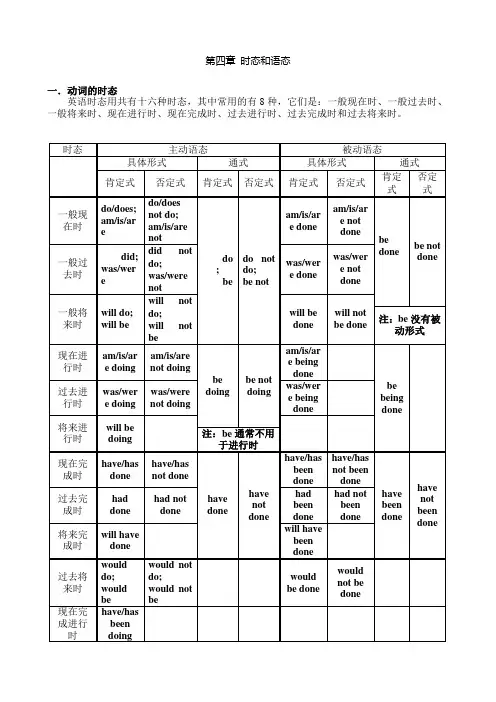
第四章时态和语态一.动词的时态英语时态用共有十六种时态,其中常用的有8种,它们是:一般现在时、一般过去时、一般将来时、现在进行时、现在完成时、过去进行时、过去完成时和过去将来时。
一. 一般现在时.1.构成. be动词:am is are ; 其他动词用动词原形,当主语是第三人称单数时要在谓语动词后加“s”,其变化规则与名词变复数一致。
2.用法. 1). 经常性或习惯性的动作,常与表示频度的时间状语连用。
如usually, always, often, seldom, never, every...,eg. I leave home for school at 7 every morning.I don’t leave home for school at 7 every morning.Do I leave home for school at 7 every morning?He usually gets up early.He doesn’t usually get up early.Does he usually get up early?2) 客观真理,客观存在,科学事实。
eg. The earth moves around the sun.The earth doesn’t move around the sun 否定句Does the earth move around the sun? 疑问句Shanghai lies in the east of China.Shanghai doesn’t lie in the east of China 否定句Does Shanghai lie in the east of China? 疑问句Water boils at 100 centigrade degrees.3) 表示格言或警句中eg. Pride goes before a fall.注意. 此用法如果出现在宾语从句中,即使主句是过去时,从句谓语也要用一般现在时。
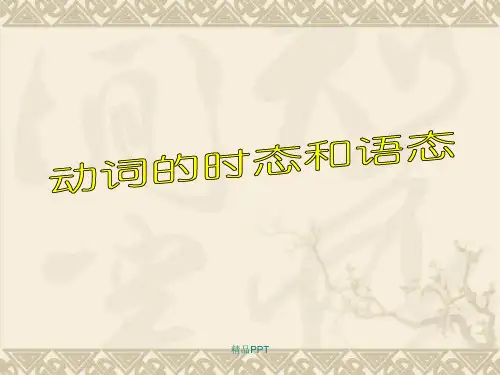
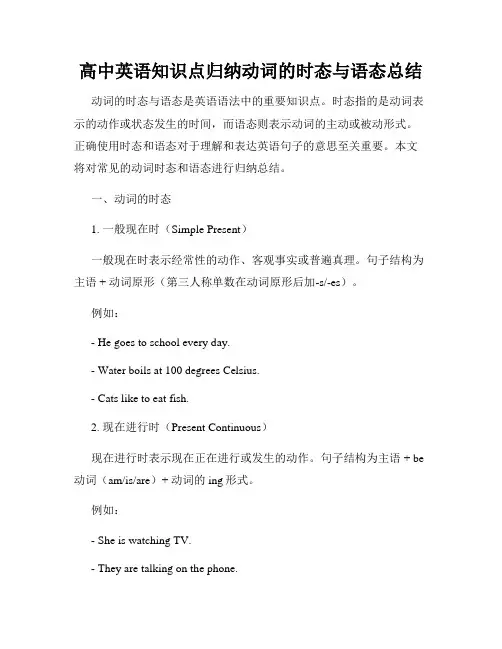
高中英语知识点归纳动词的时态与语态总结动词的时态与语态是英语语法中的重要知识点。
时态指的是动词表示的动作或状态发生的时间,而语态则表示动词的主动或被动形式。
正确使用时态和语态对于理解和表达英语句子的意思至关重要。
本文将对常见的动词时态和语态进行归纳总结。
一、动词的时态1. 一般现在时(Simple Present)一般现在时表示经常性的动作、客观事实或普遍真理。
句子结构为主语 + 动词原形(第三人称单数在动词原形后加-s/-es)。
例如:- He goes to school every day.- Water boils at 100 degrees Celsius.- Cats like to eat fish.2. 现在进行时(Present Continuous)现在进行时表示现在正在进行或发生的动作。
句子结构为主语 + be 动词(am/is/are)+ 动词的ing形式。
例如:- She is watching TV.- They are talking on the phone.- We are studying for the exam.3. 一般过去时(Simple Past)一般过去时表示发生在过去的动作或状态。
句子结构为主语 + 动词过去式。
例如:- I visited my grandparents last weekend.- He studied English in high school.- They went to the concert together.4. 过去进行时(Past Continuous)过去进行时表示过去某个时间点正在进行或发生的动作。
句子结构为主语 + was/were + 动词的ing形式。
例如:- She was cooking dinner when I called her.- They were playing soccer at the park yesterday.- We were watching a movie when the power went out.5. 一般将来时(Simple Future)一般将来时表示将来某个时间要发生的动作。


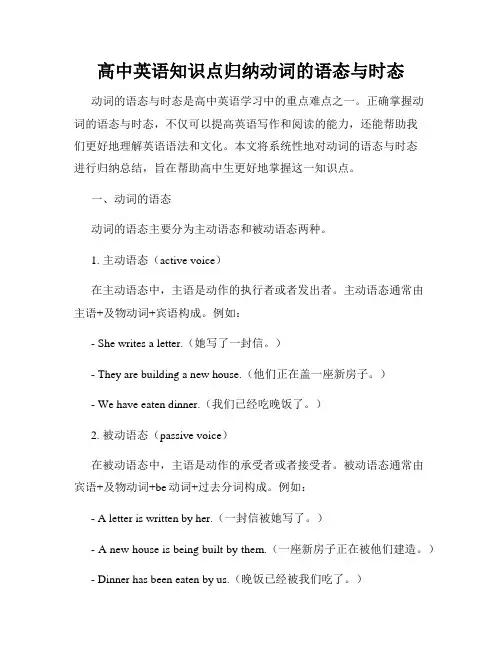
高中英语知识点归纳动词的语态与时态动词的语态与时态是高中英语学习中的重点难点之一。
正确掌握动词的语态与时态,不仅可以提高英语写作和阅读的能力,还能帮助我们更好地理解英语语法和文化。
本文将系统性地对动词的语态与时态进行归纳总结,旨在帮助高中生更好地掌握这一知识点。
一、动词的语态动词的语态主要分为主动语态和被动语态两种。
1. 主动语态(active voice)在主动语态中,主语是动作的执行者或者发出者。
主动语态通常由主语+及物动词+宾语构成。
例如:- She writes a letter.(她写了一封信。
)- They are building a new house.(他们正在盖一座新房子。
)- We have eaten dinner.(我们已经吃晚饭了。
)2. 被动语态(passive voice)在被动语态中,主语是动作的承受者或者接受者。
被动语态通常由宾语+及物动词+be动词+过去分词构成。
例如:- A letter is written by her.(一封信被她写了。
)- A new house is being built by them.(一座新房子正在被他们建造。
)- Dinner has been eaten by us.(晚饭已经被我们吃了。
)要注意的是,被动语态中的宾语在主动语态中通常是作为及物动词的宾语出现的。
同时,被动语态还可以通过不定式或现在分词的形式进行表达。
例如:- The meeting is to be held tomorrow.(会议将于明天举行。
)- The book left on the desk is mine.(留在桌子上的书是我的。
)二、动词的时态动词的时态主要包括一般现在时、一般过去时、一般将来时、现在进行时、过去进行时、过去将来时、现在完成时、过去完成时等。
1. 一般现在时(simple present tense)一般现在时表示现在经常或习惯性发生的动作或存在的状态。
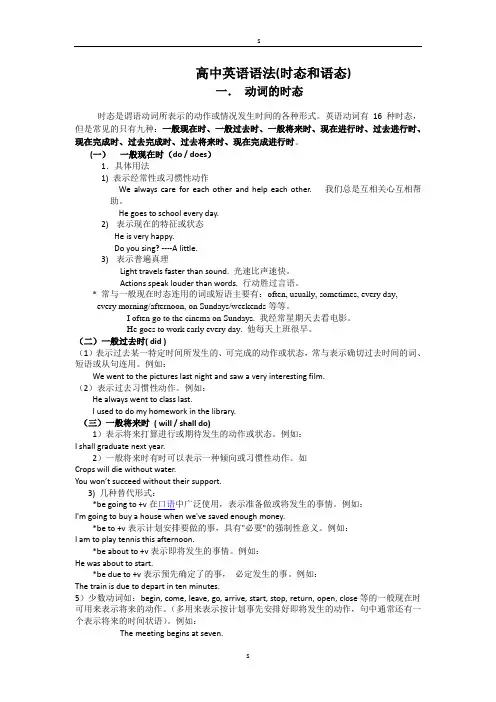
高中英语语法(时态和语态)一.动词的时态时态是谓语动词所表示的动作或情况发生时间的各种形式。
英语动词有16种时态,但是常见的只有九种:一般现在时、一般过去时、一般将来时、现在进行时、过去进行时、现在完成时、过去完成时、过去将来时、现在完成进行时。
(一)一般现在时(do / does)1.具体用法1) 表示经常性或习惯性动作We always care for each other and help each other. 我们总是互相关心互相帮助。
He goes to school every day.2)表示现在的特征或状态He is very happy.Do you sing? ----A little.3)表示普遍真理Light travels faster than sound. 光速比声速快。
Actions speak louder than words. 行动胜过言语。
* 常与一般现在时态连用的词或短语主要有:often, usually, sometimes, every day,every morning/afternoon, on Sundays/weekends等等。
I often go to the cinema on Sundays. 我经常星期天去看电影。
He goes to work early every day. 他每天上班很早。
(二)一般过去时( did )(1)表示过去某一特定时间所发生的、可完成的动作或状态,常与表示确切过去时间的词、短语或从句连用。
例如:We went to the pictures last night and saw a very interesting film.(2)表示过去习惯性动作。
例如:He always went to class last.I used to do my homework in the library.(三)一般将来时( will / shall do)1)表示将来打算进行或期待发生的动作或状态。
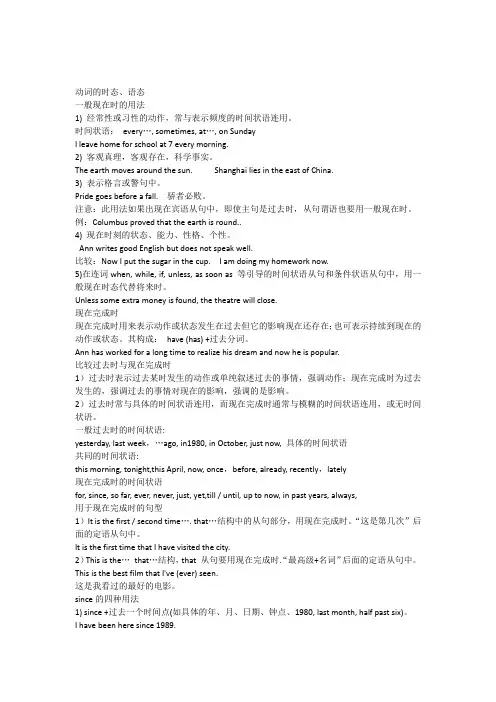
动词的时态、语态一般现在时的用法1) 经常性或习性的动作,常与表示频度的时间状语连用。
时间状语:every…, sometimes, at…, on SundayI leave home for school at 7 every morning.2) 客观真理,客观存在,科学事实。
The earth moves around the sun. Shanghai lies in the east of China.3) 表示格言或警句中。
Pride goes before a fall. 骄者必败。
注意:此用法如果出现在宾语从句中,即使主句是过去时,从句谓语也要用一般现在时。
例:Columbus proved that the earth is round..4) 现在时刻的状态、能力、性格、个性。
Ann writes good English but does not speak well.比较:Now I put the sugar in the cup. I am doing my homework now.5)在连词when, while, if, unless, as soon as 等引导的时间状语从句和条件状语从句中,用一般现在时态代替将来时。
Unless some extra money is found, the theatre will close.现在完成时现在完成时用来表示动作或状态发生在过去但它的影响现在还存在;也可表示持续到现在的动作或状态。
其构成:have (has) +过去分词。
Ann has worked for a long time to realize his dream and now he is popular.比较过去时与现在完成时1)过去时表示过去某时发生的动作或单纯叙述过去的事情,强调动作;现在完成时为过去发生的,强调过去的事情对现在的影响,强调的是影响。
高中语法复习动词时态与语态高中语法复习动词时态与语态动词时态是语法中一个非常重要的概念,它用于表示动作发生的时间、状态或者程度。
同时,动词语态则用于表示主语与动作的关系。
在本文中,我们将重点复习高中语法中的动词时态与语态,帮助同学们更好地理解和运用。
一、动词时态1. 一般现在时(Simple Present Tense)一般现在时用于表示经常性、习惯性的动作、真理、普遍规律等。
它的肯定句结构为“主语+动词原型”,否定句结构为“主语+do/does+not+动词原型”,疑问句结构为“Do/Does+主语+动词原型”。
例如:- He goes to school by bus every day.(他每天坐公交车去上学。
)- They do not like playing basketball.(他们不喜欢打篮球。
)- Does she speak English?(她会说英语吗?)2. 一般过去时(Simple Past Tense)一般过去时用于表示过去某个时间发生的动作或状态。
它的肯定句结构为“主语+动词过去式”,否定句结构为“主语+did not+动词原形”,疑问句结构为“Did+主语+动词原形”。
例如:- I watched a movie last night.(昨晚我看了一场电影。
)- They did not go to the party.(他们没有参加派对。
)- Did you finish your homework?(你完成作业了吗?)3. 一般将来时(Simple Future Tense)一般将来时用于表示将来某个时间会发生的动作或状态。
它的肯定句结构为“主语+will+动词原形”,否定句结构为“主语+will not+动词原形”,疑问句结构为“Will+主语+动词原形”。
例如:- She will go to Beijing next week.(她下周将去北京。
)- We will not have a meeting tomorrow.(明天我们不开会。
16种时态及语态总结动词时态和语态是语法中的重要概念,不仅决定了句子表达的时间和动作的发出者,还对句子的结构和语气产生影响。
本文将对16种时态及语态进行总结,并对其用法进行深入解析。
1. 现在简单时态现在简单时态表示经常性、习惯性或客观真理等情况,一般形式为:主语 + 动词原形(第三人称单数形式需加-s)。
例句:The sun rises in the east.(太阳从东方升起)2. 过去简单时态过去简单时态表示过去某个具体时间发生的动作或状态,一般形式为:主语 + 动词过去式。
例句:She called me yesterday.(她昨天给我打电话)3. 将来简单时态将来简单时态表示将要发生的动作或状态,一般形式为:主语 +will + 动词原形。
例句:I will visit my parents next week.(下周我会去看望我的父母)4. 现在进行时态现在进行时态表示现在正在进行的动作,一般形式为:主语 +am/is/are + 动词的现在分词。
例句:They are studying in the library now.(他们现在正在图书馆学习)5. 过去进行时态过去进行时态表示过去某一时刻正在进行的动作,一般形式为:主语 + was/were + 动词的现在分词。
例句:I was watching TV when he called me.(他给我打电话的时候,我正在看电视)6. 将来进行时态将来进行时态表示将来某一时刻正在进行的动作,一般形式为:主语 + will be + 动词的现在分词。
例句:She will be studying abroad this time next year.(明年这个时候她将在国外留学)7. 现在完成时态现在完成时态表示过去发生的动作对现在造成的影响或状态,一般形式为:主语 + have/has + 动词的过去分词。
例句:He has already finished his homework.(他已经完成了作业)8. 过去完成时态过去完成时态表示过去某个时间或动作发生之前已经完成的动作,一般形式为:主语 + had + 动词的过去分词。
高中英语动词的时态和语态高中英语动词的时态和语态一、动词的时态时态是谓语动词所表示的动作或情况发生时间的各种形式。
常用的有9种,即一般现在时、一般过去时、一般将来时、现在进行时、过去进行时、现在完成时、过去完成时、过去将来时、现在完成进行时(其他比较常用的还有将来进行时、将来完成时)。
(一)一般现在时I、构成:肯定式:1) ( I )+ am / do2)(单数名词、不可数名词、动词不定式和其短语、动名词及其短语、从句、HIt )+ is/does3) (复数名词、We, You, They) + are /do否定式:1) ( I ) am not / don’t do2) (单数名词、不可数名词、动词不定式和其短语、动名词及其短语、从句、HIt )is not /doesn’t do3) (复数名词、We, You, They) are not /don’t do 疑问式:1) am ( I ) / do ( I ) do …?2) is(单数名词、不可数名词、动词不定式和其短语、动名词及其短语、从句、HIt )…+?3) does(单数名词、不可数名词、动词不定式和其短语、动名词及其短语、从句、HIt )+ do…+?4) are (复数名词、We, You, They) …?5) do (复数名词、We, You, They) do … ?II、用法:1、表示经常性、习惯生的动作;表示现在的状态、特征和真理。
句中常用often, usually, every + 时间名词等时间状语。
如:1)地球绕着太阳转。
The earth moves around the sun. (真理)2)我们非常高兴。
We are very happy. (现在的状态)3)他每天坚持做早锻炼。
Haking morning exvery day.(经常性的动作)2、在时间状语从句和条件状语从句中,用一般现在时表示将来。
动词的时态与语态一、一般体1.一般体中的一般现在时、一般过去时分别表示现在、过去的经常性、习惯性动作或状态。
所谓一般体,即不表进行,又不表完成例:We have meals three times a day我们一日吃三餐(现在的习惯)He is always ready to help others.他总是乐于助人(现在的状态)When I was a boy, I often went to play in that park.我小时候常去那个公园玩(过去的习惯)2.一般现在时一一客观真理、科学事实例:The sun rises in the east.太阳从东方升起3.一般现在时还可以用在if, unless, even if引导的条件状语从句中,由when, before,until(till), as soon as, the moment, once 引导的时间状语从句中,由no matter what/who/which/when/where/how 或whatever, whoever, whichever, whenever, wherever, however引导的让步状语从句中,这时主句往往表示将来(出现will/shall/can/must )或主句是祈使句例:I ll go with you as soon as I finish my work. 我一完成工作就跟你走If city noises are not kept from increasing, people will have to shout to be heard even at the dinner table 20 years from now.如果不阻止城市噪音继续增加的话,20年后人们同在饭桌旁也得大喊着才能被听到。
Whatever you say, I will not change my mind.无论你说什么,我都不会改变主意4.语境中的一般过去时,往往表示“刚才,在过去”之意,暗示现在已“不再这样”例:—come on in, Peter. I want to show you something.皮特,进来。
高中英语语法:动词的时态与语态知识点We have meals three times a day.我们一日吃三餐。
(现在的习惯)He is always ready to help others.他总是乐于助人。
(现在的状态)When I was a boy, I often went to play in that park.我小时候常去那个公园玩。
(过去的习惯)1.一般现在时(1)一般现在时的构成一般现在时主要用动词的原形表示,如果主语为第三人称单数,则一般在动词原形后加s或一般现在时除了可以表示现在的经常性、习惯性动作或存在的状态外,还可表示:①客观真理、科学事实及自然现象。
此用法即使出现在过去语境中,也用一般现在时。
The sun rises in the east.太阳从东方升起。
②用于here, there开头的倒装句中,一般现在时表示现在正在发生的动作或存在的状态。
There goes the bell.铃响了。
Here comes the bus.公共汽车来了。
2.一般过去时(1)一般过去时的构成(2)一般过去时的用法一般过去时除了可以表示过去经常性、习惯性的动作或存在的状态外,还有以下用法:①want, hope, think, intend等动词的一般过去时往往表示“过去原……”之意。
I thought he was an honest man.我原以为他是个老实人。
He didn't intend to hurt you.他本来没打算伤害你。
②wonder的一般过去时有时也可表示现在的行为,但口气要比用一般现在时更加委婉、客气。
I wondered if you could do me a favour.我不知道你能否帮我一个忙。
③used to+动词原形,表示过去的习惯性动作而现在已经不再发生了。
We used to spend our vacation in the mountains.我们以前常常在山里度假。